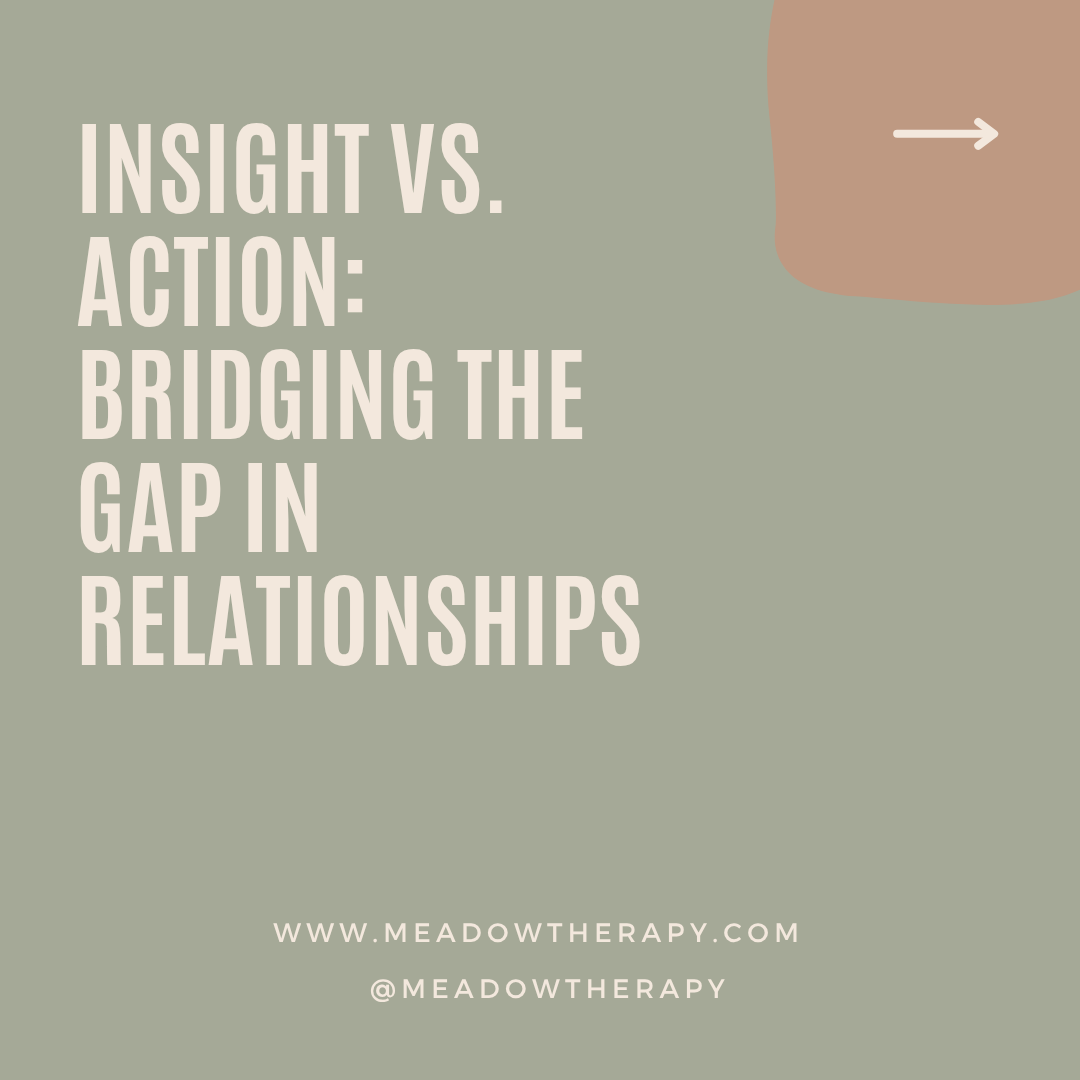Insight vs. Action: Bridging the Gap in Relationships
As a couples therapist, one of the most common challenges I see is the disconnect between insight and action. Many couples gain deep understanding about themselves and their dynamics, but struggle to translate that into meaningful change. Let’s explore how to bridge that gap.
Honesty Starts with Yourself
Change begins with honest self-reflection. Are you being truthful about what you want, need, and feel? If not, how can your partner truly meet you where you are? Start by asking:
What are the real problems I want to address?
What small, actionable steps can I take today?
Small Steps, Big Impact
Often, couples feel overwhelmed by the magnitude of change required to improve their relationship. Instead, focus on small, actionable items:
Try a new approach during your next disagreement.
Change how you initiate or navigate conflict by using a script.
Practice identifying your feelings and expressing them clearly.
For example, instead of saying, “You’re always ignoring me,” try: “I feel lonely when I don’t hear back from you.”
Scripts for Conflict
Scripts may feel unnatural at first, but they’re a tool to help you practice effective communication until it feels authentic. When emotions run high, use reminders like:
Assume the best in your partner.
Shift your perspective: If they had the best intentions, what might they mean?
Imagine their tone as kind and compassionate, even if it doesn’t come across that way initially.
Neurodiversity and Niceties
For those with ADHD or neurodivergence, typical social norms—like niceties—can feel exhausting or inauthentic. However, these behaviors often facilitate smoother interactions in a neurotypical world. Think of them as accommodations: small efforts that create relational ease. It’s not about faking; it’s about building bridges.
You can also create shortcuts, like phrases or key words to help partners understand and move past social niceties. Instead of constantly reading someone’s facial expressions and searching for meaning, ask, “What’s up?” and give them an opportunity to relay their inner experience. Then trust that what they say is what they mean! Some neurodivergent folks have to “mask” their actual experience all day and find it helpful to take off this mask when they come home. This means a neurodivergent partner may have a more neutral facial expression that neurotypical partners may read as “angry.” Instead of making assumptions, provide clarity.
Different Realities, Shared Space
Remember: the truth is often subjective. Each partner experiences the relationship differently, shaped by individual histories, nervous system responses, and ways of processing information. This difference is not about who is “right” but about finding shared understanding.
For example, sighs are often perceived as frustration, but they’re also a natural nervous system release. Instead of taking it personally, ask: “What’s going on for you right now?”
Holding Space for Emotions
When one partner cries or expresses vulnerability, the other may feel uncomfortable. It’s tempting to shut it down or make it about your discomfort (e.g. “It’s annoying to me that you always get mad at me for not doing the dishes”). Instead:
Sit with the discomfort.
Make space for their emotion.
Focus entirely on them in that moment.
Curiosity can replace defensiveness: “What makes it hard to express yourself at other times?”
Accommodations Are Acts of Love
Think of relationship needs as accommodations — they’re not burdens but ways to create a partnership where both people can thrive. Just as job accommodations help you succeed professionally, relational accommodations help you connect personally. It’s not about what feels natural to you; it’s about learning how to love your partner in the way they need.
Depersonalizing Reactions
Many conflicts arise from taking things personally that have little to do with us. Context helps depersonalize these moments:
A sigh might be their way of decompressing.
A sharp tone could stem from their stress, not your actions.
Their inability to express feelings might reflect their upbringing, not a lack of care.
Building Authentic Scripts
Finally, practice makes authenticity. Start with pre-written scripts or prompts, and tweak them until they feel right for you. The goal isn’t perfection; it’s creating space for connection, curiosity, and compassion.
Takeaway
Insight without action is like having a map but never taking the journey. By committing to small, intentional changes, practicing new ways of communicating, and holding space for each other’s humanity, couples can transform their relationships into spaces of growth and safety. Change is uncomfortable, but it’s also where intimacy begins.
If you are still struggling with insight or taking action, feel free to call me at 845-202-9814 for a free 15-minute phone consultation. I’d be happy to hear what is happening and help direct you to the right person. If you are looking for help with trauma, gender, sexuality, anxiety, or depression, you can read more about how we can help here.

